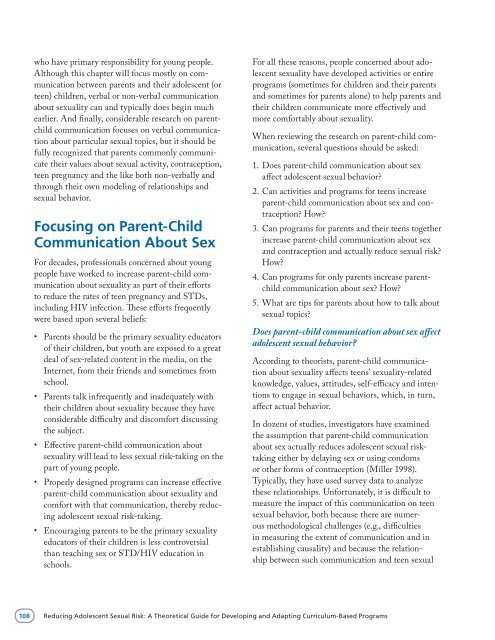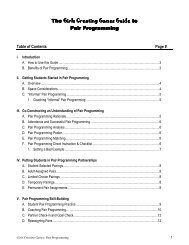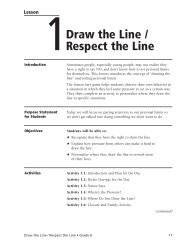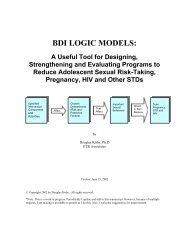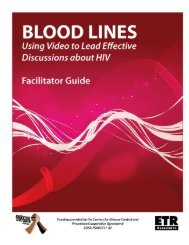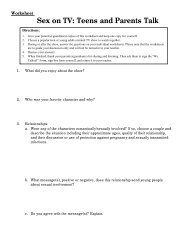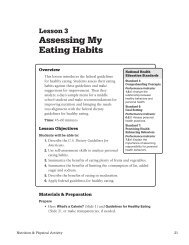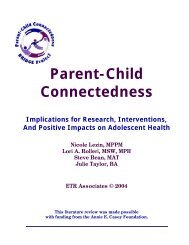who have primary responsibility for young people.Although this chapter will focus mostly on communicationbetween parents and their adolescent (orteen) children, verbal or non-verbal communicationabout sexuality can and typically does begin muchearlier. And finally, considerable research on parentchildcommunication focuses on verbal communicationabout particular sexual topics, but it should befully recognized that parents commonly communicatetheir values about sexual activity, contraception,teen pregnancy and the like both non-verbally andthrough their own modeling of relationships andsexual behavior.Focusing on Parent-ChildCommunication About SexFor decades, professionals concerned about youngpeople have worked to increase parent-child communicationabout sexuality as part of their effortsto reduce the rates of teen pregnancy and STDs,including HIV infection. These efforts frequentlywere based upon several beliefs:• Parents should be the primary sexuality educatorsof their children, but youth are exposed to a greatdeal of sex-related content in the media, on theInternet, from their friends and sometimes fromschool.• Parents talk infrequently and inadequately withtheir children about sexuality because they haveconsiderable difficulty and discomfort discussingthe subject.• Effective parent-child communication aboutsexuality will lead to less sexual risk-taking on thepart of young people.• Properly designed programs can increase effectiveparent-child communication about sexuality andcomfort with that communication, thereby reducingadolescent sexual risk-taking.• Encouraging parents to be the primary sexualityeducators of their children is less controversialthan teaching sex or STD/HIV education inschools.For all these reasons, people concerned about adolescentsexuality have developed activities or entireprograms (sometimes for children and their parentsand sometimes for parents alone) to help parents andtheir children communicate more effectively andmore comfortably about sexuality.When reviewing the research on parent-child communication,several questions should be asked:1. Does parent-child communication about sexaffect adolescent sexual behavior?2. Can activities and programs for teens increaseparent-child communication about sex and contraception?How?3. Can programs for parents and their teens togetherincrease parent-child communication about sexand contraception and actually reduce sexual risk?How?4. Can programs for only parents increase parentchildcommunication about sex? How?5. What are tips for parents about how to talk aboutsexual topics?Does parent-child communication about sex affectadolescent sexual behavior?According to theorists, parent-child communicationabout sexuality affects teens’ sexuality-relatedknowledge, values, attitudes, self-efficacy and intentionsto engage in sexual behaviors, which, in turn,affect actual behavior.In dozens of studies, investigators have examinedthe assumption that parent-child communicationabout sex actually reduces adolescent sexual risktakingeither by delaying sex or using condomsor other forms of contraception (Miller 1998).Typically, they have used survey data to analyzethese relationships. Unfortunately, it is difficult tomeasure the impact of this communication on teensexual behavior, both because there are numerousmethodological challenges (e.g., difficultiesin measuring the extent of communication and inestablishing causality) and because the relationshipbetween such communication and teen sexual108 <strong>Reducing</strong> <strong>Adolescent</strong> <strong>Sexual</strong> <strong>Risk</strong>: A <strong>Theoretical</strong> Guide for Developing and Adapting Curriculum-Based Programs
ehavior may be quite complex (Jaccard, Dittus etal. 1993).Greater parent-child communication about sex andbirth control is not consistently related to sexualbehavior (Table 9-1). One of the reasons is that theremay be a positive spurious (non-causal) relationshipbetween parent-child communication and initiationof sexual intercourse. That is, when teens becomeinvolved in romantic relationships and situationsthat might lead to initiating sexual activity, theybecome more likely to have sexual activity and theirparents become more likely to discuss delayingsexual activity (and using contraception) with them.Thus, it is not surprising that some studies showthat teens who have had sex are more likely to havediscussed delaying sex with their parents than teenswho have not had sex. However, this does not meanthat if parents talk to their teens about delaying sexbefore their teens actually have sex, their teens willhave sex sooner. In fact, two studies show that whenparents did talk with their teens about delaying theirinitiation of sex before teens had initiated sex, thenthe teens were likely to wait longer to initiate sex(Table 9-2) (East 1996; Whitaker and Miller 2000).Studies also suggest that the impact of parent-childcommunication about sexual activity may depend onvarious characteristics of parents, their children andtheir message. For example, if mothers disapproveof teens having sexual relations, communicationtakes place early, and there is a close mother-childrelationship, then mother-daughter communicationmay delay the daughter’s initiation of sexual intercourse.However, there may be less impact on delayof sexual contact if parents do not disapprove ofteens having sexual relations, the parents are talkingto sons rather than to daughters, the communicationtakes place too late, or the parents are not closeto their children (Jaccard, Dittus et al. 1993; Miller1998; Kirby and Lepore 2007).There is stronger and more consistent evidence thatwhen parents accept and support contraceptive useand encourage their teens to use contraception,then the teens are more likely to use contraception.Three studies found positive effects of parentalacceptance and support of contraception on teenuse of contraception; none found non-significantor negative effects (Kalagian, Loewen et al. 1998;Jaccard and Dittus 2000; Longmore, Manning et al.2003). Similarly, five studies found a positive effectof parent-child communication about contraception,only two found insignificant effects, and nonefound a negative effect (Table 9-3) (Casper 1990;Loewenstein and Furstenberg 1991; Reschovsky andGerner 1991; Moore, Morrison et al. 1995; Jaccard,Dittus et al. 1996; DiClemente, Wingood et al.2001; Kirby and Lepore 2007). Practical implicationsof this research are that in order to reducesexual risks, parents should discourage sexual initiationbefore their teens initiate sexual activity andsupport contraceptive use before or as soon as theirteens have sexual intercourse.Table9-1Parent-child communicationabout sex and birthcontrol (N=14)Table9-2Number of Studies Reporting anAssociation Between Parent-ChildCommunication About Sex and Teens’Initiation of SexParent-child communicationabout sex beforethe teens had initiatedsex (N=3)Table9-3LaterInitiationof SexNoSignificantRelationshipsEarlierInitiationof Sex2 6 6Number of Studies Reporting Effects ofParent-Child Communication About Sex onTeens’ Subsequent Initiation of SexDelayedInitiationof SexNoSignificantRelationshipsHastenedInitiationof Sex2 1 0Number of Studies Reporting Effectsof Parent-Child Communication AboutSex on Teens’ Condom or OtherContraceptive UseParent-child communicationabout sex and birthcontrol (N=7)Increased Useof Condomsor OtherContraceptivesNoSignificantRelationshipReduced Useof Condomsor OtherContraceptives5 2 0Chapter 9 Increasing Parent-Child Communication About Sex 109
- Page 1:
Reducing AdolescentSexual RiskA The
- Page 4 and 5:
ETR Associates (Education, Training
- Page 6 and 7:
AcknowledgmentsThis book evolved ou
- Page 8 and 9:
Activities, Boxes and FiguresActivi
- Page 11 and 12:
1 IntroductionThis book was created
- Page 13 and 14:
• Children of teenage mothers are
- Page 15 and 16:
Table1-2 The 17 Characteristics of
- Page 17:
Each of the following chapters focu
- Page 20 and 21:
“determinants,” “behaviors,
- Page 22 and 23:
model, provide evidence regarding h
- Page 24 and 25:
to avoid unwanted sex and then synt
- Page 26 and 27:
Figure2-3 An Example of a Logic Mod
- Page 28 and 29:
Figure2-3 An Example of a Logic Mod
- Page 30 and 31:
Figure2-3 An Example of a Logic Mod
- Page 32 and 33:
Table2-2Learning Objectives to Redu
- Page 34 and 35:
Table2-2Learning Objectives to Redu
- Page 36 and 37:
Table2-3Learning Objectives to Incr
- Page 38 and 39:
Table2-4Learning Objectives to Incr
- Page 40 and 41:
Table2-6Learning Objectives to Incr
- Page 43 and 44:
3 Increasing KnowledgeKeys to Incre
- Page 45 and 46:
Table3-1Number of Studies Reporting
- Page 47 and 48:
Box3-1Types of Activities to Increa
- Page 49 and 50:
partner does not mind using a condo
- Page 51 and 52:
methods more often. For example, th
- Page 53 and 54:
4ImprovingPerceptions of Risks—Bo
- Page 55 and 56:
1. Do teens’ perceptions of risk
- Page 57 and 58:
a. Presentations and discussions of
- Page 59 and 60:
Table4-5Examples of Items That Have
- Page 61 and 62:
Pregnancy Risk Activity and Follow-
- Page 63 and 64:
STD Handshake(Continued)Important C
- Page 65 and 66:
5AddressingAttitudes,Values and Bel
- Page 67 and 68: Theories ofAttitude ChangeAttitudes
- Page 69 and 70: Although both quality and quantity
- Page 71 and 72: • When arguments are presented by
- Page 73 and 74: that it is possible to improve thes
- Page 75 and 76: c. Use simulations to demonstrate p
- Page 77 and 78: Table5-4Examples of Survey Items fr
- Page 79 and 80: Table5-4Examples of Survey Items fr
- Page 81 and 82: Activity 5-2Dreams, Goals and Value
- Page 83 and 84: Activity 5-4“Dear Abby”Descript
- Page 85 and 86: 6CorrectingPerceptionsof Peer Norms
- Page 87 and 88: Is there a gap between perceptions
- Page 89 and 90: 3. Use concepts, language, symbols,
- Page 91 and 92: Table6-4Examples of Items That Have
- Page 93 and 94: 7 Increasing Self-Efficacy and Skil
- Page 95 and 96: feelings may reduce their self-effi
- Page 97 and 98: situations more difficult so that t
- Page 99 and 100: paper (e.g., the air should be sque
- Page 101 and 102: Activity 7-1Lines That People Use t
- Page 103 and 104: Situations That May Lead to Unwante
- Page 105 and 106: Roleplaying to Enhance Refusal Skil
- Page 107: Activity 7-5Using Condoms Correctly
- Page 110 and 111: chaperoned, they may not have the o
- Page 112 and 113: attitudes about condoms and contrac
- Page 114 and 115: Activity 8-1Description of Activity
- Page 117: 9IncreasingParent-ChildCommunicatio
- Page 121 and 122: 5. Give students multiple homework
- Page 123 and 124: and the activities suggested prior
- Page 125 and 126: Activity 9-1Description of Activity
- Page 127 and 128: Activity 9-3Human Sexuality Board G
- Page 129 and 130: 10 ConclusionsKeys to Reducing Sexu
- Page 131 and 132: Figure10-1Assessing Factors in Curr
- Page 133 and 134: sexual minority youth and pressure
- Page 135 and 136: Table10-1Instructional Principles I
- Page 137: Table10-1Instructional Principles I
- Page 140 and 141: Incidence The number of new cases o
- Page 143 and 144: ResourcesThree kinds of resources a
- Page 145 and 146: Science-Based Practices: A Guide fo
- Page 147 and 148: National Longitudinal Study of Adol
- Page 149 and 150: Changing Social Normshttp://www.etr
- Page 151 and 152: Advocates for Youth, Young Women of
- Page 153 and 154: ReferencesAbelson, R., and Prentice
- Page 155 and 156: Coyle, K. (2006). All4You2! Prevent
- Page 157 and 158: Lapsey, D.K. (1993). Toward an inte
- Page 159 and 160: Weed, S.E., Olsen, J.A., DeGaston,


